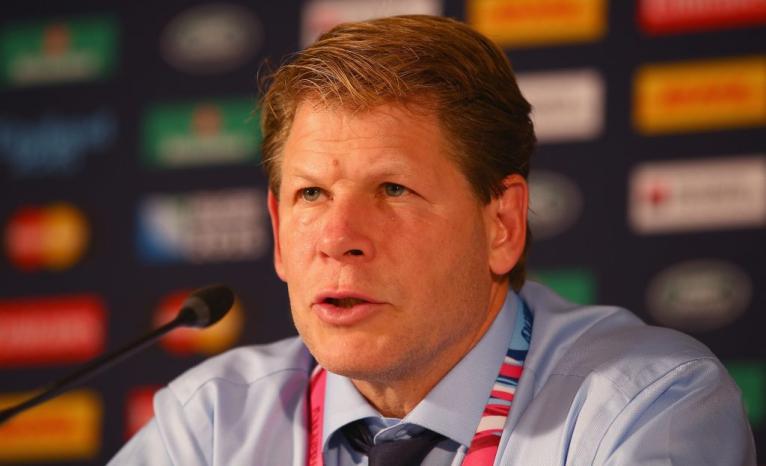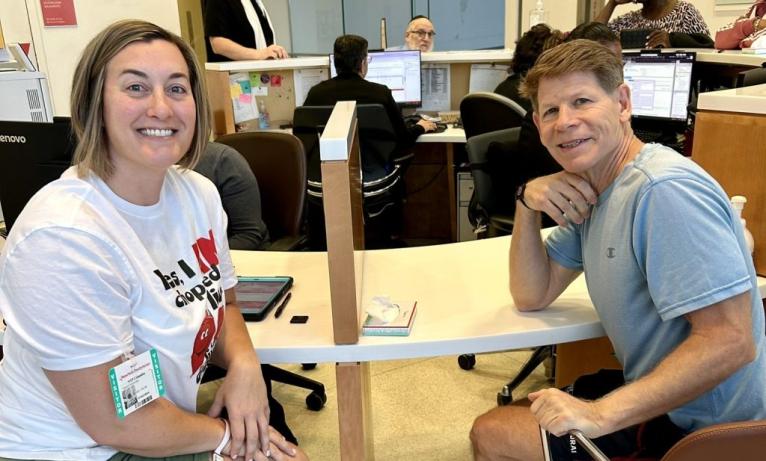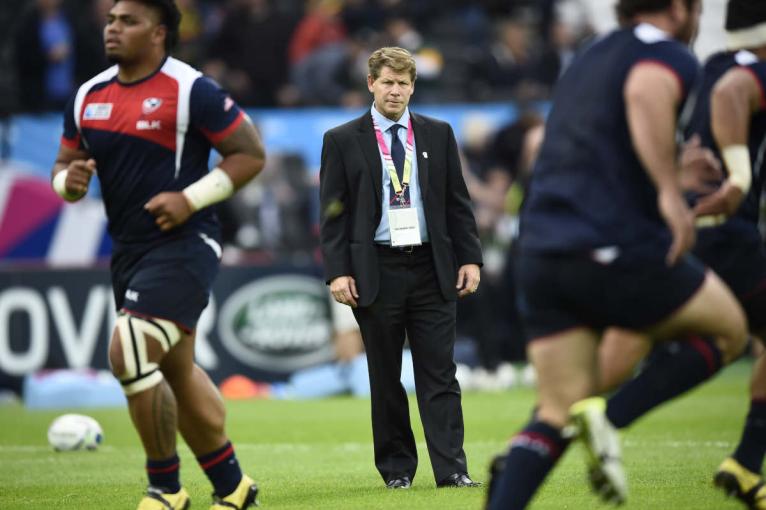Mike Tolkin’s eyes light up and a smile beams across his face. We have spent the past half hour discussing his recent liver transplant with his donor Traci Schmidtke Young, but it is not her selfless generosity or his continued recovery that is providing the electric charge. Not at this precise moment, anyway.
Chatting via video call less than 24 hours after USA claimed a dramatic women’s sevens bronze medal at Paris 2024, it is the Olympic exploits of Ilona Maher, Alex Sedrick and co which have caught his imagination.
“It’s been amazing watching the women win,” former USA coach Tolkin tells RugbyPass. “It looked like it wasn’t going to happen and all of a sudden, we have a 90-yard run and it happens. It’s meant so much in the States, to us rugby players.”
It might seem trite to compare what Tolkin and Young have been through with Sedrick’s lung-busting heroics at Stade de France but there are certainly echoes within their story.

Tolkin was faced with a seemingly interminable wait when it became obvious last year he would need to undergo a liver transplant if he was to beat cancer once and for all. A couple of early hits came to nothing and there were further false dawns following his decision to seek a living donor.
His prospects changed at the start of March, however, when Young saw an appeal put out on Tolkin’s behalf on social media by former USA Sevens player and rugby commentator Dallen Stanford. The pair did not know each other, but aware she had the right blood type, Young was moved to do whatever she could to help a fellow member of the American rugby community.
Ultimately, that led her, wife Wendy and their son Cole on a journey across the country from their home in Texas to the banks of the Hudson River and NewYork-Presbyterian Hospital. It was there, at the beginning of July, Young donated 60% of her liver to Tolkin.
“I can never state it enough, and it doesn’t get old, I’m so grateful for her stepping forward,” Tolkin says.
“I’m glad it was her because she’s such a great, energetic rugby person too. So, I’m forever grateful she came forward to do this, and she produced a fantastic liver for me to be able to use. So, yeah, I can’t say that enough.”
Even when I met Traci for the first time in person, she was like, ‘Wow, you look a lot better than I thought you’d be looking!’
Tolkin and Young’s story starts at the beginning of 2022, when some routine tests unearthed a hepatocellular carcinoma (HCC) on his liver. Essentially a growth on the organ, HCC is the most common liver cancer and is responsible for more than 12,000 deaths in the USA every year.
A procedure removed the growth but when another one appeared only 18 months later, and following a second surgery, Tolkin’s doctors advised that a transplant would be the best course of action.
“Given the fact two had emerged within a year-and-a-half,” Tolkin recalls matter-of-factly, “they suggested maybe looking into getting a new liver. So, that seemed to make sense.
“That’s the best way of getting rid of the potential cancer to re-emerge. And also with multiple procedures, the liver can start to scar and harden and get into a cirrhotic state, which is not a good way for it to function and ultimately to die.
“So, that began the pathway.”
Although Tolkin, who led his country to Rugby World Cup 2015, was on the road to getting a new liver there would have been few outward signs he was suffering as he criss-crossed the States in 2022 and 2023.
Symptoms of HCC can include abdominal discomfort, weight loss, jaundice, nausea and bleeding but they did not get in the way of his work as Premier Rugby Sevens General Manager.
“With [liver] cancer, if it’s being treated, you don’t really have too many effects. So, you live your life pretty normally,” Tolkin adds. “It kind of works insidiously and over time it will start to erode you.
“And even when I met Traci for the first time in person, she was like, ‘Wow, you look a lot better than I thought you’d be looking!’ It’s kind of weird that way because you feel fairly good and you’re doing your normal stuff but, you know, it can go south quickly.”

Tolkin was put on a deceased donor waiting list in December 2023 and settled in for a long wait. But despite having a low MELD score – the grade used to indicate a patient’s disease severity – he received two hits for potential donors within weeks.
“It was around Christmas, and I got two immediate hits from deceased donors, which was really unusual,” Tolkin says. “But they didn’t work out.”
Instead, following consultation with his family and friends, Tolkin decided to begin the search for a living donor in March. The benefits of doing so are manifold as it can reduce waiting times and aid recovery time and survival rates.
This was also when Tolkin really began to feel the warm embrace of the American rugby community as long-term team-mates, colleagues, players and friends lent their support to the search for that healthy living donor.
“It was a little tough to start because, myself, probably most people are private and you want to keep your business to yourself,” Tolkin says. “So, at first, you don’t want to go out there with this news to the whole world.
It was like three weeks later and my phone rang, and it was the hospital saying that I was next up.
“But Bruce McLane, Kitty McNally, Tim Walsh and Dallen Stanford were great champions for me. And they got it out over social media and all my networks, and it soon spread.
“And, you know, over time, we really had people who were interested in doing it and being donors.”
One of the people who read the appeal was Young, who was shown a post from Stanford by her wife Wendy. The couple are former players themselves, remain proud and active members of their local community and run the Scrumhalf Connection (YSCRugby) website.
However, they did not know Tolkin personally and had only met him once, very briefly, at a sevens tournament in Austin.
“It was asking for an O-neg donor, and she knows I’m O-negative, so she sent the link and was like, ‘Hey, look at this’,” Young says. “I read through the post about him and we kind of looked at each other.
“It was honestly very non-eventful. It was like, ‘What do you think?’ ‘What do you think?’ ‘Should we do it?’ ‘Why not?’ And the original process was just filling out a form, you know, like your contact information, basic health information, what blood type you were.
“And, so, we kind of both were like, well, it’s just a form. It doesn’t hurt to fill it out. So, I filled it out. It was early March… And then, honestly, I just sat for a couple of weeks because they had other people going through the process.”
Traci and Wendy might not have hesitated in pledging their support for Mike but the logistics of being his donor did present the couple with challenges. It would require them to relocate nearly 2,000 miles to New York for around three weeks; a mission made all the more acute as their son Cole has a disability.
“There were other people going through the process, so they were like, we will just call you if you’re needed,” Young adds. “It was like three weeks later and my phone rang, and it was the hospital saying that I was next up.”
Over the next couple of months, Young underwent bloodwork in Texas and held a number of video calls with a host of medical professionals; a surgeon, general doctor, psychiatrist, nurse and social worker in order to prepare her for potentially becoming a living donor.
Then, on 6th June she boarded a flight to New York for more blood tests, an EKG, a “very long” MRI and to meet with the doctor and surgeon in person. “That was like the final step to see if I was good, if my liver was the right size,” Young recalls.
“They told me from that step that it would take a week for them to make a decision. So, when I got there, I remember calling Wendy and I was like, ‘Something’s telling me we need to start planning. I think we’re coming to New York’. That’s when we really started thinking about, OK, how are we going to pull this off?”
Tolkin was out for lunch with a friend on 17th June when he received a message to contact the hospital. Having suffered several near misses, it would be understandable had he done so with a degree of trepidation.
“I call the hospital, and they said it’s on, and it’s going to happen pretty quickly, which is great,” he says. “No one wants to hang around waiting for these things. You know, especially with health and just with everything. So, I was glad, obviously that it was happening, that it was Traci, and that it was happening pretty quickly.”
View this post on Instagram
Young says: “I just pictured Mike sitting there just waiting and waiting and waiting, and what that would have felt like. So, I was just happy to relieve that for him and his family.”
A fortnight after Tolkin dialled the hospital number he was sat alongside Young, enjoying a pre-operation meal and getting to know the woman who would ultimately save his life. “We fattened ourselves up and got ready for surgery!” the former Rugby United New York coach jokes.
“It was amazing, it was comfortable. You know, Traci’s really outgoing and we all love rugby. We had a couple of friends there and we were just, you know, like old friends, part of the rugby community and [had] a lot of laughs.
“It was really casual and… I had a lot of energy in me because I knew this person was doing so much for me. But on top of that, we had the rugby, I think our personalities meshed. So, it was fun.”
Young had returned to New York for some pre-op assessments on June 27th, with Wendy, Cole and their friend Jess arriving three days later. “I felt great the whole time,” she says. “I was not nervous or concerned or anything until I walked into the operating room.
“When they opened the doors and I saw the robot machine that was going to do my surgery, I had like, ‘Ooooh’, and that was the only moment of like, ‘oh my God, what am I about to do?’
“But then of course, I laid down and went to sleep and that was gone. So, I mean, this whole time I felt really like I’m supposed to do this. I was meant to do this. I was here to help Mike. And so, the whole time it was a wonderful experience for me.”
The “robot machine” Young references was also a sign that the pair were in good hands. NewYork-Presbyterian was the first hospital in the world to offer fully laparoscopic living donor transplant surgery, making the operation less invasive.
I felt like I was hit by a truck. I totally underestimated the discomfort.
That being said, it did not mean the act of donating two thirds of her liver was pain free. “I felt like I was hit by a truck. I totally underestimated the discomfort,” Young admits when remembering how she felt post-op.
Remarkably, Young was released from hospital within two days of having the operation, while Tolkin was discharged two days after that.
Both remain under supervision, Tolkin takes 23 pills a day and receives weekly blood tests to make sure that the organ is not being rejected. He will also have to limit contact with the outside world for the next three months and be careful with the food he eats for the rest of his life. “No sushi, no steak tartare,” he laments.
Young will have two more MRI scans in New York, four months and one year on from surgery, to make sure that her liver has grown at the expected rate. All being well, it will regenerate to its former size while Tolkin’s will grow to around 95 per cent.
“We all know it, but it shows the true meaning of the values that we try to espouse in the game of rugby, in all our players and clubs, and it comes through in moments like this,” Tolkin says, his grin stretching back across his face.

“Any team I coached, one thing that I always said is that we can accomplish so much more as a group than any one person can accomplish individually. And that was always something I said to all my teams.
“And this is true here. My group, my community went to work for me, and Traci stepped forward from that community. So, our whole rugby community really came through. And me trying to do it alone never would have happened.”
Young adds: “Even though I didn’t really know Mike, I automatically felt connected with him. I automatically felt like this is my team-mate I have to help him.
“And I was trying to explain it to my parents and they’re not rugby people, so they weren’t understanding. But this is what we do. As soon as you meet somebody that plays rugby, you’re immediately connected to that person.
“And that’s the beauty of the rugby community.”
Before Young returned to work and her recovery in Texas, she and Wendy made a pit-stop in Washington, DC last month to attend the US Rugby Hall of Fame ceremony on Tolkin’s behalf. The legendary coach was the eighth and final member of the class of 2024 to be inducted at the Mayflower Hotel.
“Here I am,” he said in a pre-recorded message. “And that’s a great thing.”


Comments
Join free and tell us what you really think!
Sign up for free